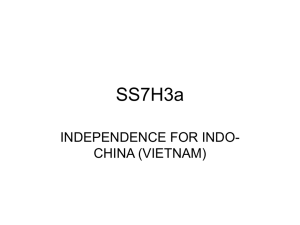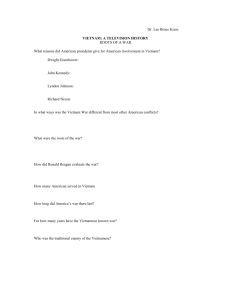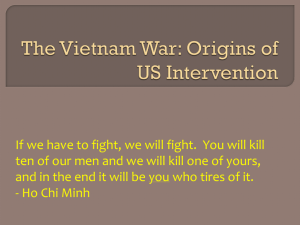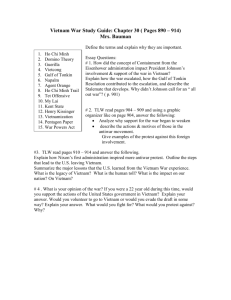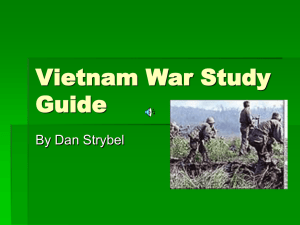"Indochine" Powerpoint Presentation
advertisement
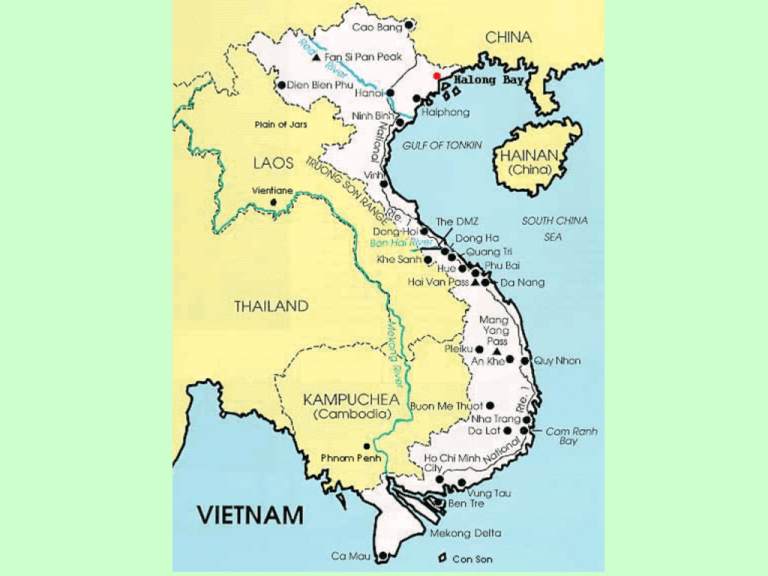
Modern Vietnamese Flag The five points of the star stand for the farmers, workers, intellectuals, youth and soldiers. Adopted 1955 How Did the French Become the Colonial Masters of Vietnam? French Indochina War 1882-1883 In 1881, China declared sovereignty over Annam or Vietnam, sending troops down the Red River to occupy its northern region, Tonkin. France, under the pretext of protecting their Catholic missionaries from Vietnamese cruelty, renewed its colonial expansionism in Indochina (Vietnam, Laos, and Cambodia), which China opposed. French captain Henri Laurent Riviere (1827-83) was sent with a small force to Tonkin's administrative center, Hanoi, to evict the Chinese and to subdue the rebel "Black Flag Pirates." French Indochina War 1882-1883 He captured the Hanoi fortress, Nam Dinh's coast, and the Hon Gay coal mine. During a Vietnamese counterattack, Riviere was killed. French reinforcements were sent to the area, and France obtained a Vietnamese agreement on a treaty ceding Tonkin (1882). When China renounced the agreement, the French seized Haiphong and Hanoi and bombarded the Vietnamese capital of Hue (1883). French Indochina War 1882-1883 During the fighting, both sides negotiated and finally signed a treaty (August 25, 1883) that recognized French protectorates over northern Vietnam (Tonkin) (dong kinh = eastern capital) and central Vietnam (Annam) (an nam = peace of the south) ; southern Vietnam (Cochin China) was already under French control. Ten years later Siam relinquished to the French its claims to Laos, which was incorporated into a federation known as French Indochina. The French instituted one of the most severe of colonial regimes, with the peasantry ground into the dirt with draconian taxes (for example, alcohol was heavily taxed but each village was forced to buy a certain quota of government-produced alcohol yearly!). Any sign of rebellion was savagely crushed, and the fearsome Sureté (secret police) was apt to drag off nationalist sympathizers at the slightest provocation. The island of Poulo Condore (Can Dao) became the largest prison in Asia. Children working in a paper mill in Tonkin Palais du Gouverneur, Saigon – Cochinchine, 1904 Une Carte Postale Pagoda in Hanoi, Tonkin 1930 A Yunnam woman, 1928 See her shoes! But while Indochina may have seemed a paradise to the Europeans (providing French colonists with rich pickings from trade in rubber, rice, tea, coffee and coal), it was very much a hell for many of the natives. Some of the native educated class (most of which worked for the French) became active in anti-colonial work, which usually resulted in swift imprisonment or execution, but some of these men did establish some nationalist organizations in the country - particularly the mountainous districts. But many were forced to flee abroad to preach their beliefs and build up support. With the fall of France in 1940, Indochina was internationally isolated, and largely left to her own devices by the Petain regime. The Japanese, realising the weakness of the French colony, kept the French administration in place as a "puppet" regime, and the French Sureté in particular clamped down even harder on any sign of rebellion/dissent in the native population. But eventually, in 1945, the Japanese took total control over Indochina. When the Chinese invaded Tonkin, and the British took Annam and Cochinchine, the Allies decided to give Indochina back to the French. The main problem was what to do with the various nationalist/communist groups which had fought against the Japanese, and now wanted their independence... The main anti-Japanese organization was the nationalist/communist group controlled by Ho Chi Minh. This organization was founded in 1941, but Ho Chi Minh had been active in nationalist and socialist politics well before that. He was the Comintern representative in Vietnam in 1930, and founded the Communist Party of Indochina in 1930. After the Japanese surrender at the end of WWII, Ho pushed for total independence for Vietnam, and the French held that it was a colony. Despite fruitless meetings between representatives of the British occupiers and the Viet Minh, tension escalated until things came to a head in November 1946. Fighting then broke out between the two sides in Haiphong, and a truce was called. However, General Giap then launched a surprise attack on Hanoi in December and called for a popular rising against the French. Ho Chi Minh made a similar broadcast two days later, and fighting erupted throughout Tonkin. The Indochina War had started... Who was Ho Chi Minh? Ho Chi Minh was the figurehead, the emotional leader, the “hero” of Vietnam. (Note: General Giap was the man who developed the strategy, planned the battles, and ultimately defeated everyone who chose to fight against Vietnam.) The youngest of three children, Ho was born Nguyen Sinh Cung in 1890 in a village in central Vietnam. The area was indirectly ruled by the French through a puppet emperor. Its impoverished peasants, traditional dissidents, opposed France's presence; and Ho's father, a functionary at the imperial court, manifested his sympathy for them by quitting his position and becoming an itinerant teacher . Ho was familiar with the lofty French principles of liberté, égalité, fraternité and yearned to see them in practice in France. In 1911 he sailed for Marseilles as a galley boy aboard a passenger liner. In 1919, Woodrow Wilson arrived in France to sign the treaty ending World War I, and Ho, supposing that the President's doctrine of selfdetermination applied to Asia, donned a cutaway coat and tried to present Wilson with a lengthy list of French abuses in Vietnam. Rebuffed, Ho joined the newly created French Communist Party. "It was patriotism, not communism, that inspired me," he later explained. Soon Ho was roaming the earth as a covert agent for Moscow. Disguised as a Chinese journalist or a Buddhist monk, he would surface in Canton, Rangoon or Calcutta--then vanish. Again and again, he was reported dead, only to pop up in a new place. In 1929 he assembled a few militants in Hong Kong and formed the Indochinese Communist Party. He portrayed himself as a celibate, a pose calculated to epitomize his moral fiber, but he had at least two wives or perhaps concubines. One was a Chinese woman; the other was Giap's sister-in-law, who was guillotined by the French. Slipping across the Chinese frontier into Vietnam--his first return home in three decades--he urged his disciples to fight both the Japanese and the French. There, in a remote camp, he founded the Viet Minh, an acronym for the Vietnam Independence League, from which he derived his nom de guerre, Ho Chi Minh--roughly "Bringer of Light." There was no flexibility in Ho's beliefs, no bending of his will. Even as the war increasingly destroyed the country, he remained committed to Vietnam's independence. And millions of Vietnamese fought and died to attain the same goal. Ho died on Sept. 2, 1969, at the age of 79, some six years before his battalions surged into Saigon. Aspiring to bask in the reflected glory of his posthumous triumph, his heirs put his embalmed body on display in a hideous granite mausoleum copied from Lenin's tomb in Moscow. They violated his final wishes. In his will he specified that his ashes be buried in urns on three hilltops in Vietnam, saying, "Not only is cremation good from the point of view of hygiene, but it also saves farmland!" Ho Chi Minh visits a textile factory, 1965 http://members.lycos.co.uk/Indochine/index.html#top http://www.teacheroz.com/fire.htm "We Didn't Start The Fire" by Billy Joel Now you are ready to watch the movie INDOCHINE
